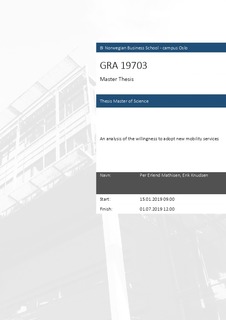An analysis of the willingness to adopt new mobility services
Master thesis
Permanent lenke
http://hdl.handle.net/11250/2621887Utgivelsesdato
2019Metadata
Vis full innførselSamlinger
- Master of Science [1621]
Sammendrag
This research has contributed to the understanding of how changing customer
preferences, technological innovation, and environmental needs will shape future
mobility services. Consequently, this thesis explores how the automobile industry
should adapt their business models to offer mobility services as a response to these
trends. To explore this concept, the study examines to what extent six independent
variables of customer preferences- and characteristics affect the customer’s
willingness to adopt new mobility services. In turn, the findings have identified the
most significant factors for a distributor to integrate when shaping future mobility
services.
The six independent variables have been extracted based on a literature review on
the topic of business models and mobility services, as well as the topic of customer
innovativeness and environmentalism. An online survey was distributed to carusers
in the greater Oslo region to collect data on the topic. To analyze the data,
quantitative research has been applied by conducting a multiple regression analysis
to test the hypotheses and to identify the effect of each independent variable on the
willingness to adopt new mobility services.
The findings show that the significant predictors of a customer’s willingness to
adopt new mobility services are the customer preferences on economic flexibility
and availability, and the customer characteristics on environmentalism and attitude
toward new mobility services. As a result of the findings, the paper argues that the
distributor should ensure a high level of economic flexibility for the customer and
a high level of availability of the product when shaping new mobility services.
Moreover, the distributor should brand future mobility service as environmentally
friendly. Lastly, the findings indicate that there is a positive attitude toward new
mobility services among the customers in the Norwegian market. Consequently,
distributors should take action now by offering mobility services in order to capture
economies of scale as a result of first-mover advantages and to avoid becoming
industry laggards.
Beskrivelse
Masteroppgave(MSc) in Master of Science in Business, Logistics, operations and supply chain management - Handelshøyskolen BI, 2019
